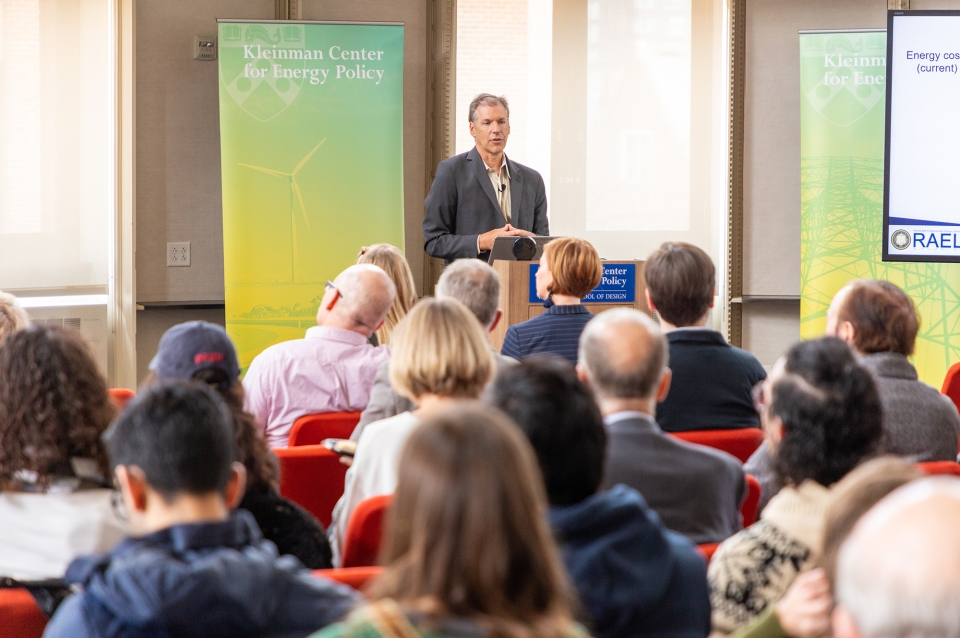March 3, 2020
Cultivating the Next Generation of Energy Policy Minds at the Kleinman Center
By Jared Brey

Dan Kamen, a visiting scholar at the Kleinman Center for Energy Policy, speaking at the Energy Forum
Stuart Weitzman School of Design
102 Meyerson Hall
210 South 34th Street
Philadelphia, PA 19104

Dan Kamen, a visiting scholar at the Kleinman Center for Energy Policy, speaking at the Energy Forum
Michael Grant
mrgrant@design.upenn.edu
215.898.2539
The clean energy revolution is here. Finally. That was the message from Dan Kammen, a visiting scholar at the Kleinman Center for Energy Policy who is Class of 1935 Distinguished Professor of Energy at UC Berkeley and founding director of its Renewable and Appropriate Energy Laboratory (RAEL), in a public lecture at the Kleinman Forum last month.
Kammen, a physicist who served in the U.S. State Department under former secretaries Hillary Clinton and John Kerry, is uniquely positioned to talk about the convergence of science and politics in the climate crisis, and his message wasn’t lost on the audience that afternoon or the day before, when a small group of undergraduates at Penn got a preview of the talk over lunch.
The lunch was organized as part of the Kleinman Center’s new undergraduate Climate and Energy Policy Fellows Program, designed to engage select students from across Penn campus. Last semester, they applied for the opportunity to take part in a spring series of lunchtime seminars with experts like Kammen on topics like energy markets, climate science, environmental risk management, adaptive design, and environmental justice. By the end of the semester, each student will write a short piece—informed by the seminars they’ve attended—to be considered for publication on the Kleinman Center website.
“The goal of this program is to give our student fellows the opportunity to explore and discuss climate and energy topics with experts, focus their interests, and contribute their voice to the Kleinman Center’s growing online research library,” says Oscar Serpell, a Kleinman Center research associate who helps coordinate the student fellows program.
When Serpell and his colleagues at the Center began accepting applications for the program last fall, they expected to get around a dozen. But more than 30 students applied, from a range of programs in the School of Arts & Sciences, Penn Engineering, the Vagelos Integrated Program in Energy Research (VIPER), and the Wharton School. The first cohort includes 17 students, and the Center has plans to run the program again next Spring.
“The application pool included students from three of the four undergraduate schools and from a diversity of departments. We tried hard to make sure we were attracting students from all across campus,” Serpell says.
The seminars are designed to expose students to a range of disciplines within the larger field of climate and energy policy. In addition to Kammen, lunchtime speakers have included Senior Lecturer Nicholas Pevzner from the Department of Landscape Architecture, Wharton Risk Center Executive Director Carolyn Kousky, Professor and Chair of Philosophy Michael Weisberg, and a handful of PhD students.
For the Kleinman Center, this student fellows program is a chance to enlist undergraduates as unofficial ambassadors for climate and energy policy work across Penn. For students, it’s a chance to explore the field before committing to a course of study in graduate school. At Kammen’s lunchtime talk, students asked questions about viability of nuclear energy and biofuels, the structure of incentives for clean energy in developing countries, and Kammen’s experience in the State Department. (He resigned as the State Department’s science envoy in dramatic fashion in the first year of the Trump administration.) More universities are experimenting with how to organize curricula and courses of study around energy policy, sustainability, and climate movements, Kammen said after the talk. And Kleinman’s non-credit, cross-disciplinary approach to working with undergraduates is a part of that experimentation.
“If we learned one lesson from the last decades, it’s that a science-only movement around climate has not been successful,” Kammen said. “To say [to students], ‘Well, this is a great thing, but only do it when you go to grad school’ is a total waste of curiosity and student interest.”
In addition to meeting climate and energy scholars and diving into writing projects, students will also have the opportunity to participate in a field trip. In April, they will visit an energy innovation lab in south Philadelphia, adjacent to the now-closed Philadelphia Energy Solutions (PES) site.
Emma Glasser, a Kleinman Center undergraduate fellow who studies material sciences and engineering in the VIPER program and is a member of Fossil Free Penn, says she wants to research energy science and climate change, but hasn’t known how to best merge the two. The lunchtime talks have been an opportunity to explore the possibilities. For her end-of-semester publication, she’s thinking through ideas related to the high-quality green jobs guarantee aspect of the Green New Deal. The range of speakers in the seminar have only reinforced the ways that energy and climate policy connect to so many other disciplines and concerns.
“I’m learning where the knowledge that I’m [gaining] fits into the bigger picture,” Glasser says.